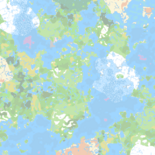Munda: Difference between revisions
No edit summary |
No edit summary |
||
| (16 intermediate revisions by 3 users not shown) | |||
| Line 25: | Line 25: | ||
|} | |} | ||
'''Munda''' is a small tribal nation | '''Munda''' is a small tribal nation on four jungle islands of the [[Lakes of Mondego|Mondego Lakes]] region. It is currently a protectorate of [[Adraria]], following the end of the Mondego War, which refers to it as the "'''Formerly Independent Republic of Munda (FIROM)'''". It was formerly occupied by [[Ashannar]], which called it the "'''bca_ Containment Zone'''" prior to the war. | ||
Munda has Mistense culture, though it has historically operated very independently of other Mistense nations. Diplomatically, it is largely driven by the Cult of the Flood, which calls for raising the water levels in the Mondego Lakes. | |||
==Etymology== | ==Etymology== | ||
| Line 33: | Line 35: | ||
==History== | ==History== | ||
===Discovery and Settlement=== | ===Discovery and Settlement=== | ||
[[file:TheSinkhole.png|thumb|230px|left|The Sinkhole, | [[file:TheSinkhole.png|thumb|230px|left|The Sinkhole, flooded during the First Mondego Flood.]] | ||
Munda was first explored on the first day of the server, when bca_ passed through the Mondego Lakes region on her way to found the town of [[Anneimd]] in the far West. The location would remain largely untouched until the | Munda was first explored on the first day of the server, when bca_ passed through the Mondego Lakes region on her way to found the town of [[Anneimd]] in the far West. The location would remain largely untouched until the First Mondego Flood, when large sections of the jungle were placed underwater, and the Sinkhole was flooded. The waters of the sinkhole now serve as the boundary between Adrarian and Mundan territory. | ||
After the gods banished the waters, in May 2024 bca_ returned to the area to act as a base of operations for future flooding. Simultaneously, the people of Ashannar came to the area, settling in the region and constructing numerous structures. A verbal agreement to preclude conflict was reached between Ashannar and Munda with the following terms: | After the gods banished the waters, in May 2024 bca_ returned to the area to act as a base of operations for future flooding. Simultaneously, the people of Ashannar came to the area, settling in the region and constructing numerous structures. A verbal agreement to preclude conflict was reached between Ashannar and Munda with the following terms: | ||
| Line 47: | Line 49: | ||
By early August the tidings of war were apparent. As Munda first began asserting itself on the international stage, both through further development and by being placed on a map, warnings of a possible invasion by Ashannar were commonplace. As a result, Mundans began work on Fort Munda as a safe location in case of a prolonged siege. This and an obstinate attitude towards foreigners only increased scrutiny however, and soon two wars would begin. | By early August the tidings of war were apparent. As Munda first began asserting itself on the international stage, both through further development and by being placed on a map, warnings of a possible invasion by Ashannar were commonplace. As a result, Mundans began work on Fort Munda as a safe location in case of a prolonged siege. This and an obstinate attitude towards foreigners only increased scrutiny however, and soon two wars would begin. | ||
===War=== | ===War Against Danouvia-Scneimunt=== | ||
{{main|Mondego War}} | |||
[[file:FortMunda.png|thumb|230px|right|Fort Munda in lockdown soon after Ashannar declared war.]] | [[file:FortMunda.png|thumb|230px|right|Fort Munda in lockdown soon after Ashannar declared war.]] | ||
In early August 2024, tensions escalated when [[Danrejk]], a representative of [[Danouvia-Scneimunt]], triggered a lockdown at Fort Munda by repeatedly pressing a clearly marked button despite the stated warning: | In early August 2024, tensions escalated when [[Danrejk]], a representative of [[Hollenberg|Danouvia-Scneimunt]], triggered a lockdown at Fort Munda by repeatedly pressing a clearly marked button despite the stated warning: | ||
{| style="margin: 0 auto; text-align: center; border: 1px solid #f0f0f0; background-color: #f8f8f8; width: 12em | {| style="margin: 0 auto; text-align: center; border: 1px solid #f0f0f0; background-color: #f8f8f8; width: 12em | ||
| Line 57: | Line 59: | ||
|} | |} | ||
This act was interpreted as a declaration of war, as per the sign. Danrejk was quickly attacked and fled the scene. Munda—desiring not to be bullied by more powerful nations—cited previous hostilities such as the theft of sniffers by Ashannar, and responded by declaring war on Danouvia. Fort Munda was subsequently sealed to all foreigners as Munda prepared for war. | This act was interpreted as a declaration of war, as per the sign. Danrejk was quickly attacked and fled the scene. Munda—desiring not to be bullied by more powerful nations—cited previous hostilities such as the theft of sniffers by Ashannar, and responded by declaring war on Danouvia-Scneimunt. Fort Munda was subsequently sealed to all foreigners as Munda prepared for war. | ||
Following the incident with Danouvia, the Ashannari Empire declared war on Munda under the pretext of quelling a "minor rebellion." This action violated the prior verbal agreement between Munda and Ashannar, which had maintained peace in the region. While the Ashannari dismissed Munda—not directly mentioning Munda in the declaration and scrubbing the island from later maps—bca_ emphasized Munda's resolve to resist aggression. Munda offered terms of surrender to Ashannar, demanding recognition of Munda’s sovereignty, the return of any occupied lands, and a symbolic Heart of the Sea. | Following the incident with Danouvia, the Ashannari Empire declared war on Munda under the pretext of quelling a "minor rebellion." This action violated the prior verbal agreement between Munda and Ashannar, which had maintained peace in the region. While the Ashannari dismissed Munda—not directly mentioning Munda in the declaration and scrubbing the island from later maps—bca_ emphasized Munda's resolve to resist aggression. Munda offered terms of surrender to Ashannar, demanding recognition of Munda’s sovereignty, the return of any occupied lands, and a symbolic Heart of the Sea. | ||
As of | After the declaration by Ashannar, Munda shifted its focus away from Danouvia-Scneimunt, so bca_ and Danrejk agreed to settle the dispute in a duel for honor that took place on the island of Dagma. Danrejk won the duel, pushed the button one more time, and gave bca_ a Dwarven horn as a reminder of his victory. For a time, he referred to bca_ as an "honorary elf." | ||
{{Infobox battle | |||
|name=[[Mondego War]] | |||
|image=PrettiestAshannariBuilding.png | |||
|location=Middle Mondego | |||
|image_alt=A haphazard tower of dirt and netherrack stands over a jungle edge biome, as seen from the top of a jungle tree across a river. | |||
|image_caption=The tower Ashannar used to break the siege of Fort Munda during the second battle. | |||
|date=Aug. 1 to Nov. 5, 2024<br>{{ArcaneDate|year=2024|month=8|day=1}} to 16 | |||
|result=Ashannari Defeat, Mundan Victory, Adrarian Victory | |||
|combatant1=🐐 Munda | |||
|combatant2=[[File:Ashannar Flag.png|border|20px]] Elysean Empire of Ashannar<br>[[File:AdrariaFlag.png|border|20px]] Adrarian Ascendancy | |||
|commander1=🐐 bca_ | |||
|commander2=[[File:Ashannar Flag.png|border|20px]] Sol Aureus<br>[[File:AdrariaFlag.png|border|20px]] Dregate | |||
|strength1=1 soldier<br>0-1 foreign volunteers | |||
|strength2=2-4 soldiers | |||
|casualties1=Dozens | |||
|casualties2=None}} | |||
===War Against Ashannar=== | |||
On the morning of Day 12 of the war, Ashannar launched its invasion from Durial, taking the settlement of Magma without resistance. bca_ retreated into Fort Munda, preparing for a prolonged siege. Despite the loss, Munda reaffirmed its conditions for Ashannari surrender: recognition of Munda’s sovereignty, the return of occupied land, and a symbolic Heart of the Sea. | |||
In the second battle that afternoon, Ashannari forces escalated their offensive, constructing a makeshift siege tower of netherrack and dirt in Attalica under suppressive bowfire from Fort Munda. Sol Aureus used the tower to leap over the fort’s walls, killing bca_ and capturing it. Ashannar declared victory, looting all of Munda. bca_ fled westward to the island of Dagma. | |||
Over the following weeks, bca_ remained in hiding, constructing Fort Dagma just south of Attalica while slowly rebuilding Munda. Over this time, Ashannar was weakening and many of its members were preparing to leave for other territories. On Day 70, with Munda’s strength renewed and Ashannar in decline, bca_ declared war once more, standing by the original surrender terms. | |||
===War Against Adraria=== | |||
As Ashannar withdrew from the Mondego Lakes, the Adrarian Ascendancy sought to claim its former holdings, including Munda. This led to an alliance between Ashannar and Adraria in defense of Ashannar's Mondego island territory, setting the stage for the next phase of the war. | |||
On Day 86, Mundan forces seized Isussa and Attalica before the Ashannari and Adrarian joint forces could reinforce them, but were repelled from Fort Munda. Control of the fort shifted multiple times during the battle, ultimately remaining in Adrarian hands. A foreign volunteer briefly fought for Munda but arrived late and poorly equipped. Following the battle, bca_ vowed that Munda would resist Adraria for as long as it had resisted Ashannar. | |||
On Day 93, Adraria, having learned Ashannari tactics, constructed a siege tower inside Fort Munda, deploying it to capture Fort Dagma. Simultaneously, Adrarian forces arrived quickly enough to reinforce Magma and Fort Munda before either could be captured. With the fall of its last and only settlement, Munda was once again forced westward, retreating to Split Island to regroup. While the war was set to continue, both sides recognized that a definitive military victory was unlikely. Brief peace negotiations failed to yield a treaty. | |||
On Day 96, Ashannar formally dissolved, ceding its remaining holdings to Adraria. The following day, Adraria unilaterally declared a peace treaty, describing Munda as the Formerly Independent Republic of Munda (FIROM). The treaty allowed for the renewed flooding of the Mondego lakes, and for bca_ to return to Munda. The treaty was never formally signed, but still effectively ended the war. | |||
===Second Mondego Flood=== | |||
Following the end of the Mondego War, Munda successfully gained permission to flood the Middle Mondego, but was left impoverished after all resources from Fort Dagma and Fort Munda had been drained. Over the next months, the water level was raised over much of the southwestern Middle Mondego and Adraria constructed a dam across one of the main rivers leading away from the lakes. | |||
Eventually, bca_ traded the head of Sol Aureus to the Adrarians in exchange for armor and tools looted during the war. After this, the pace of flooding accelerated. | |||
==Geography== | ==Geography== | ||
[[file: | [[file:Munda2024Oct26.png|thumb|230px|right|A map of Munda and surrounding territories, published October 26, 2024.]] | ||
Munda is located on several jungle islands on the boundary Middle and Little Mondego. | |||
The easternmost and most developed island is called Munda, and it is home to the town of Magma and Fort Munda. It is artificially separated from the mainland Ashannari town of Durial by the remnants of the First Mondego Flood, most notably in the Sinkhole. | |||
The northernmost island is Dagma and was first settled by the Ashannaris in the north, before the construction of Fort Dagma in the south. It is mostly plains and is by far the least forested of the islands. Another island in the south is thus far unsettled by the Mundans, though it has the abandoned Ashannari building called Isussa on it. | |||
Finally, the most recently settled island is Split Island in the west. Named as such because of the Split Island Slough that divides it between a dense jungle in the eastern half and a beach in the west. A small settlement was created on the western beach during the last days of the Mondego War. | |||
==Culture== | ==Culture== | ||
[[file:MundaHut.png|thumb|230px|left|A typical Mundan hut, showcasing the use of local building materials and stilts.]] | |||
Munda is a self-sustaining community that relies heavily on its natural resources. The residents of Munda manually farm almost all of their produce and raw materials, including cacao beans, bamboo, kelp, wheat, and exotic flowers. The land is rich in biodiversity, with Munda being the only known location where pitcher plants grow in the wild. | Munda is a self-sustaining community that relies heavily on its natural resources. The residents of Munda manually farm almost all of their produce and raw materials, including cacao beans, bamboo, kelp, wheat, and exotic flowers. The land is rich in biodiversity, with Munda being the only known location where pitcher plants grow in the wild. | ||
The architecture in Munda reflects the community’s resource pool and cultural beliefs. A strong belief in the inevitability of another great flood shapes much of Mundan life and has led to the construction of buildings on stilts in Mundan towns and villages. Typical Mundan huts are constructed from bamboo frames with roofs made of woven kelp and are high enough off the ground to be walked under, adding to Munda's unique aesthetic. Mundan villages are often centered around giant jungle trees, which serve as natural landmarks and community gathering points. The terrain is left largely untouched. | |||
Culturally, Munda is a strange split off from the [Mistense] culture that originated in Anneimd. Though this is not readily apparent from its architecture and customs, the Cult of the Flood that drives Mundan architecture, tradition, and diplomacy flows from worship of the Mistenist Divine Being Adamastor, who rules over the seas. In Mistenist myth, Adamastor perpetually clashes with Baco, who rules over the land. Mundans seek to end the current era of peace between Baco and Adamastor by bringing about the next Calamity, through which they believe Adamastor will reign victorious and flood all of Cinder. | |||
[[Category:Former countries]] | |||
Latest revision as of 15:30, 10 May 2025
| Munda | ||
|---|---|---|
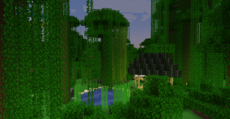 The settlement of Magma at dusk. The settlement of Magma at dusk.
| ||
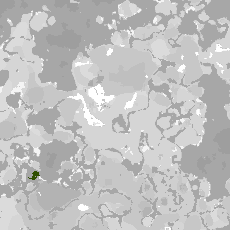 A map of north–central Cinder with Munda shown in dark green. A map of north–central Cinder with Munda shown in dark green.
| ||
| Population | 1 | |
| Denizens | bca_ | |
| Demonym | Mundan | |
| Coordinates |
| |
| Capital | Fort Munda | |
| Nation Type | Tribal | |
Munda is a small tribal nation on four jungle islands of the Mondego Lakes region. It is currently a protectorate of Adraria, following the end of the Mondego War, which refers to it as the "Formerly Independent Republic of Munda (FIROM)". It was formerly occupied by Ashannar, which called it the "bca_ Containment Zone" prior to the war.
Munda has Mistense culture, though it has historically operated very independently of other Mistense nations. Diplomatically, it is largely driven by the Cult of the Flood, which calls for raising the water levels in the Mondego Lakes.
Etymology
Munda is the archaic, Hispano-Celtic word for Mondego and roughly translates to transparency, clarity, or purity. This word refers to both the lakes that surround Munda and to the waters that Mundans seek to bring forth from it.
History
Discovery and Settlement
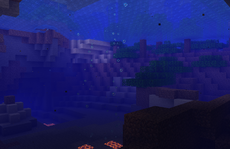
Munda was first explored on the first day of the server, when bca_ passed through the Mondego Lakes region on her way to found the town of Anneimd in the far West. The location would remain largely untouched until the First Mondego Flood, when large sections of the jungle were placed underwater, and the Sinkhole was flooded. The waters of the sinkhole now serve as the boundary between Adrarian and Mundan territory.
After the gods banished the waters, in May 2024 bca_ returned to the area to act as a base of operations for future flooding. Simultaneously, the people of Ashannar came to the area, settling in the region and constructing numerous structures. A verbal agreement to preclude conflict was reached between Ashannar and Munda with the following terms:
- Munda cannot expand towards any other islands
- Munda cannot expand the island or modify the surrounding terrain and ocean
- If Munda joins Ashannar the first term is void
Growing Tensions with Ashannar
Beginning in early May, Ashannar began showing Munda as claimed by Ashannar on maps and referred to it as the "bca_ Containment Zone". Soon after, the first sign of real-world conflict would break out when Ashannar stole three sniffers living in the jungle and transported them across the sinkhole. One of these sniffers was found tied up in Durial and was recovered. This theft prompted Munda to place bamboo spikes and warning signs around the island of Munda. Over the next few months very little changed and the settlement of Magma was slightly expanded.
By early August the tidings of war were apparent. As Munda first began asserting itself on the international stage, both through further development and by being placed on a map, warnings of a possible invasion by Ashannar were commonplace. As a result, Mundans began work on Fort Munda as a safe location in case of a prolonged siege. This and an obstinate attitude towards foreigners only increased scrutiny however, and soon two wars would begin.
War Against Danouvia-Scneimunt
- Main article: Mondego War
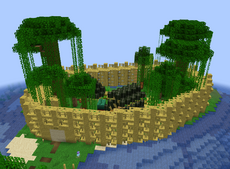
In early August 2024, tensions escalated when Danrejk, a representative of Danouvia-Scneimunt, triggered a lockdown at Fort Munda by repeatedly pressing a clearly marked button despite the stated warning:
| ⚠WARNING⚠ Press this Button and I Declare WAR |
This act was interpreted as a declaration of war, as per the sign. Danrejk was quickly attacked and fled the scene. Munda—desiring not to be bullied by more powerful nations—cited previous hostilities such as the theft of sniffers by Ashannar, and responded by declaring war on Danouvia-Scneimunt. Fort Munda was subsequently sealed to all foreigners as Munda prepared for war.
Following the incident with Danouvia, the Ashannari Empire declared war on Munda under the pretext of quelling a "minor rebellion." This action violated the prior verbal agreement between Munda and Ashannar, which had maintained peace in the region. While the Ashannari dismissed Munda—not directly mentioning Munda in the declaration and scrubbing the island from later maps—bca_ emphasized Munda's resolve to resist aggression. Munda offered terms of surrender to Ashannar, demanding recognition of Munda’s sovereignty, the return of any occupied lands, and a symbolic Heart of the Sea.
After the declaration by Ashannar, Munda shifted its focus away from Danouvia-Scneimunt, so bca_ and Danrejk agreed to settle the dispute in a duel for honor that took place on the island of Dagma. Danrejk won the duel, pushed the button one more time, and gave bca_ a Dwarven horn as a reminder of his victory. For a time, he referred to bca_ as an "honorary elf."
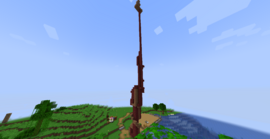
War Against Ashannar
On the morning of Day 12 of the war, Ashannar launched its invasion from Durial, taking the settlement of Magma without resistance. bca_ retreated into Fort Munda, preparing for a prolonged siege. Despite the loss, Munda reaffirmed its conditions for Ashannari surrender: recognition of Munda’s sovereignty, the return of occupied land, and a symbolic Heart of the Sea.
In the second battle that afternoon, Ashannari forces escalated their offensive, constructing a makeshift siege tower of netherrack and dirt in Attalica under suppressive bowfire from Fort Munda. Sol Aureus used the tower to leap over the fort’s walls, killing bca_ and capturing it. Ashannar declared victory, looting all of Munda. bca_ fled westward to the island of Dagma.
Over the following weeks, bca_ remained in hiding, constructing Fort Dagma just south of Attalica while slowly rebuilding Munda. Over this time, Ashannar was weakening and many of its members were preparing to leave for other territories. On Day 70, with Munda’s strength renewed and Ashannar in decline, bca_ declared war once more, standing by the original surrender terms.
War Against Adraria
As Ashannar withdrew from the Mondego Lakes, the Adrarian Ascendancy sought to claim its former holdings, including Munda. This led to an alliance between Ashannar and Adraria in defense of Ashannar's Mondego island territory, setting the stage for the next phase of the war.
On Day 86, Mundan forces seized Isussa and Attalica before the Ashannari and Adrarian joint forces could reinforce them, but were repelled from Fort Munda. Control of the fort shifted multiple times during the battle, ultimately remaining in Adrarian hands. A foreign volunteer briefly fought for Munda but arrived late and poorly equipped. Following the battle, bca_ vowed that Munda would resist Adraria for as long as it had resisted Ashannar.
On Day 93, Adraria, having learned Ashannari tactics, constructed a siege tower inside Fort Munda, deploying it to capture Fort Dagma. Simultaneously, Adrarian forces arrived quickly enough to reinforce Magma and Fort Munda before either could be captured. With the fall of its last and only settlement, Munda was once again forced westward, retreating to Split Island to regroup. While the war was set to continue, both sides recognized that a definitive military victory was unlikely. Brief peace negotiations failed to yield a treaty.
On Day 96, Ashannar formally dissolved, ceding its remaining holdings to Adraria. The following day, Adraria unilaterally declared a peace treaty, describing Munda as the Formerly Independent Republic of Munda (FIROM). The treaty allowed for the renewed flooding of the Mondego lakes, and for bca_ to return to Munda. The treaty was never formally signed, but still effectively ended the war.
Second Mondego Flood
Following the end of the Mondego War, Munda successfully gained permission to flood the Middle Mondego, but was left impoverished after all resources from Fort Dagma and Fort Munda had been drained. Over the next months, the water level was raised over much of the southwestern Middle Mondego and Adraria constructed a dam across one of the main rivers leading away from the lakes.
Eventually, bca_ traded the head of Sol Aureus to the Adrarians in exchange for armor and tools looted during the war. After this, the pace of flooding accelerated.
Geography
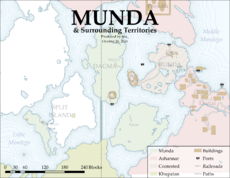
Munda is located on several jungle islands on the boundary Middle and Little Mondego.
The easternmost and most developed island is called Munda, and it is home to the town of Magma and Fort Munda. It is artificially separated from the mainland Ashannari town of Durial by the remnants of the First Mondego Flood, most notably in the Sinkhole.
The northernmost island is Dagma and was first settled by the Ashannaris in the north, before the construction of Fort Dagma in the south. It is mostly plains and is by far the least forested of the islands. Another island in the south is thus far unsettled by the Mundans, though it has the abandoned Ashannari building called Isussa on it.
Finally, the most recently settled island is Split Island in the west. Named as such because of the Split Island Slough that divides it between a dense jungle in the eastern half and a beach in the west. A small settlement was created on the western beach during the last days of the Mondego War.
Culture
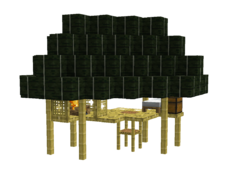
Munda is a self-sustaining community that relies heavily on its natural resources. The residents of Munda manually farm almost all of their produce and raw materials, including cacao beans, bamboo, kelp, wheat, and exotic flowers. The land is rich in biodiversity, with Munda being the only known location where pitcher plants grow in the wild.
The architecture in Munda reflects the community’s resource pool and cultural beliefs. A strong belief in the inevitability of another great flood shapes much of Mundan life and has led to the construction of buildings on stilts in Mundan towns and villages. Typical Mundan huts are constructed from bamboo frames with roofs made of woven kelp and are high enough off the ground to be walked under, adding to Munda's unique aesthetic. Mundan villages are often centered around giant jungle trees, which serve as natural landmarks and community gathering points. The terrain is left largely untouched.
Culturally, Munda is a strange split off from the [Mistense] culture that originated in Anneimd. Though this is not readily apparent from its architecture and customs, the Cult of the Flood that drives Mundan architecture, tradition, and diplomacy flows from worship of the Mistenist Divine Being Adamastor, who rules over the seas. In Mistenist myth, Adamastor perpetually clashes with Baco, who rules over the land. Mundans seek to end the current era of peace between Baco and Adamastor by bringing about the next Calamity, through which they believe Adamastor will reign victorious and flood all of Cinder.
